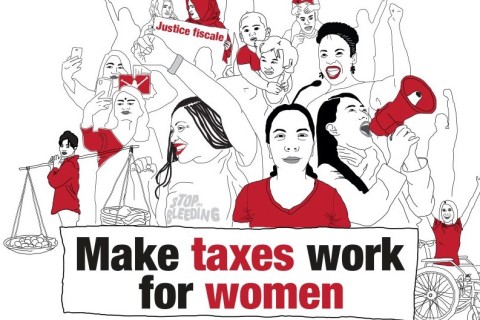
Photo credit: Global Alliance for Tax Justice
This International Women’s Day, Canadians for Tax Fairness joins its tax justice allies around the world in calling for progressive tax reforms to tackle gender inequalities.
Women bear the brunt of harmful tax practices and policies, such as tax dodging and regressive tax cuts. Lost tax revenues in Canada and developed countries draw government resources away from public services that especially support women, such as education and childcare. In poorer countries, foregone revenues can mean a matter of life or death for millions of women.
The pandemic has exacerbated gender inequality. COVID-19’s health, economic and social effects have been disproportionately felt by women, even more so among lower-income households and communities of color.
As the Global Alliance for Tax Justice points out, women make up about 70% of the healthcare workforce, exposing them to greater risk of infection. Women have also been more likely to lose their jobs and income in the pandemic, face increased risks of violence at home, and shoulder most of the care burden due to school and childcare closures.
Even as some segments of the economy rebound, women workers –especially lower-income and visible minorities—are being left behind.
Canadian economist Armine Yalnizyan has aptly dubbed this effect the “she-cession” and pointed out that there can be “no recovery without ‘she-covery’ and no ‘she-covery’ without childcare”
Government recovery plans need to address the virus’ unequal impact by creating and strengthening social programs to help more women return to work. Studies have shown that investments such as childcare pay off in increased labour participation, government revenues, and economic activity.
Other programs such as affordable housing and national pharmacare would also directly benefit women, particularly from lower-income households, while helping to regenerate the economy.
Canada can afford these investments by making the tax system more progressive. Our Fair Tax Recovery Plan recently estimated the government could raise over $60 billion annually by eliminating a number of regressive tax loopholes and by making the tax system more progressive—and less sexist.
The government can support women by making the tax system fairer in the following ways:
Combat international tax haven use: Canada loses at least $8 billion a year to tax havens, but it could be as much as $25 billion -- foregone revenues that are needed to strengthen public services and support the recovery. Offshore tax avoidance also hurts women in other countries. A study by the Tax Justice Network found Canada is responsible for $10.5 billion in tax losses in other countries, with poorer developing countries suffering the most.
The government can do more to tackle offshore tax dodging, including ending double non-taxation agreements with tax havens, requiring large corporations to publicly report taxes paid in each country, and treating multinationals as single entities for tax purposes so they can’t avoid taxes through subsidiaries.
Close regressive—and sexist—tax loopholes: The tax system contains many tax loopholes that not only cost the government billions in lost revenues but also contribute to wealth and gender inequality by primarily benefiting men and the richest Canadians. In his Are Tax Loopholes Sexist? report CCPA economist David Macdonald showed that four out of five personal tax loopholes analyzed—and particularly the more regressive ones—provide greater benefits to men than to women. One example is the stock option deduction -- over 90% of the benefits of this loophole goes to the top 1% and 77% of the total benefit goes to men. With over $100 billion going to tax expenditures and loopholes annually, this is a lot of funding that erodes equality and doesn’t support women’s needs.
Target the extreme concentration of wealth at the top: While women and lower-income workers have been the most hurt by the virus’ economic and social impacts, Canada’s top billionaires –all of whom are men-- grew their wealth by $53 billion during the pandemic. The country’s wealth gap continues to widen with the richest Canadians now owning a quarter of all wealth. The Liberals have committed to tax extreme inequality, but without bolder action, their proposals to date would have little impact.
Our report “It’s time to tax extreme wealth inequality” shows how the government could raise as much as $20 billion a year by introducing an annual net wealth tax on the richest households and makes a number of other tax policy recommendations to target wealth and gender inequality.
Improve how the tax system works for women: The federal government recently committed to introduce automatic tax filing for low-income Canadians, a service that will help more women receive important benefits such as the Canada Child Benefit. We’re pushing for the government follow through on this promise, which will be an important step to reduce poverty and improve how women, especially from marginalized communities, interact with the tax system.
These are just some of the tax measures we’ve advocated for to reduce inequality and promote a more inclusive recovery.
In the coming days, we’ll be adding our voice to the Global Days of Action campaign, which calls on governments around the world to introduce progressive tax reforms for women. The campaign runs from March 15-21 to coincide with the 65th Session of the United Nations Commission on the Status of Women and the International Monetary Fund/World Bank virtual Civil Society Policy Forum. To learn more, visit the GATJ’s website.
